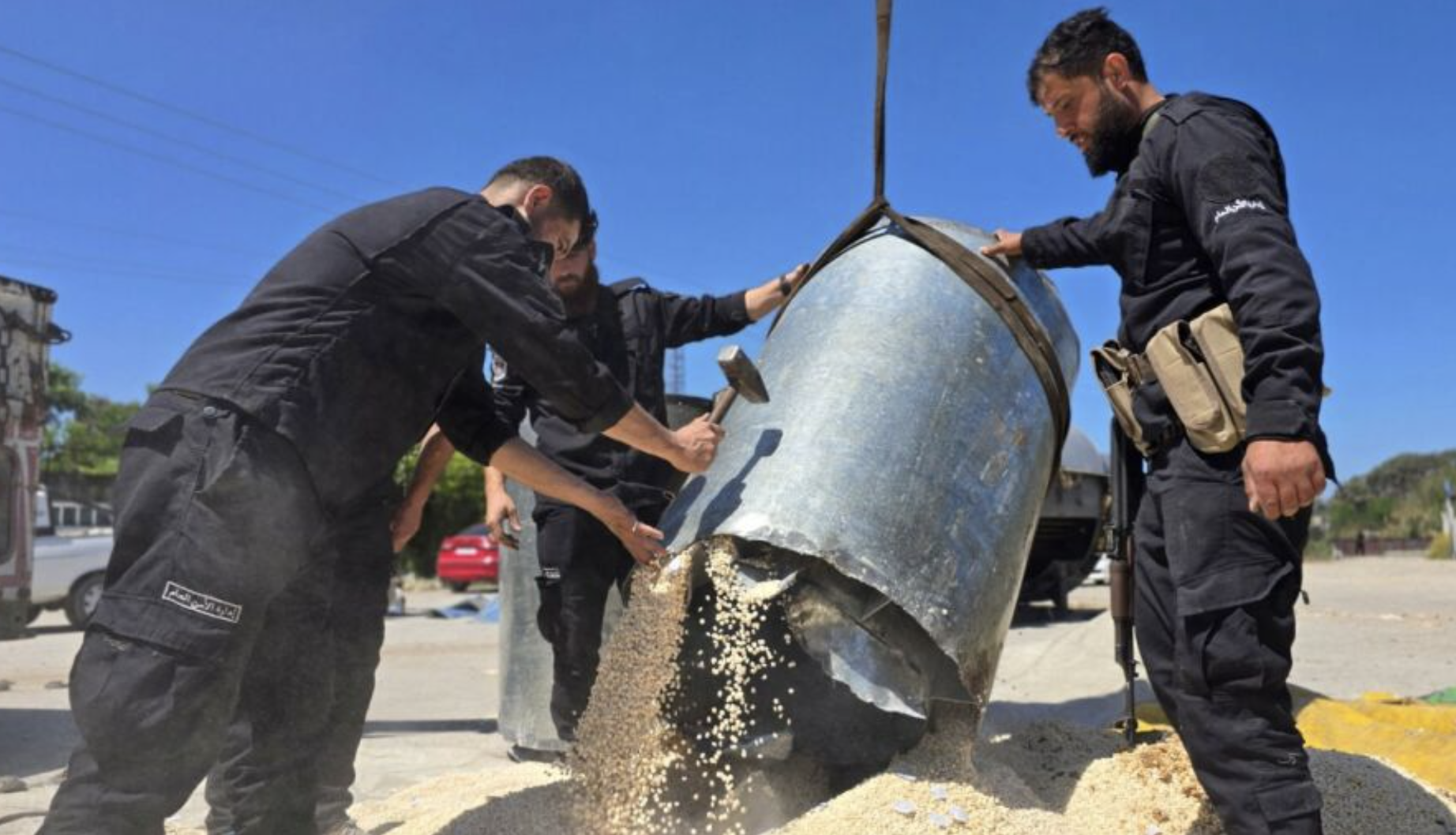Smugglers in the Sky and on Foot: How Drugs Keep Flowing from Syria to Jordan

“Smuggling networks take advantage of how easy it is to produce drugs to maximize their profits.”
Although the regime of Bashar al-Assad, which oversaw drug production and smuggling, has fallen, remnants of his networks are still active and continue to pose a threat to Syria’s neighbors, especially Jordan.
Since Assad’s ousting on December 8, 2024, the Jordanian army has regularly reported intercepting drug smuggling attempts along its 375-kilometer border with Syria.

Ongoing Smuggling Attempts
On May 25, 2025, Jordanian authorities announced they had foiled an attempt to smuggle 200,000 narcotic pills through the Jaber border crossing with Syria using a cargo vehicle. The authorities said they had tracked the shipment, identified the vehicle, and located the individuals set to receive the drugs inside Jordan.
That same day, the Jordanian army intercepted two drones attempting to smuggle drugs into southern Jordan and successfully brought them down.
In a separate incident on May 24, 2025, traffickers attempted an unusual smuggling method along the northeastern border with Syria and Iraq, using remote-controlled balloons to deliver drugs into Jordan. The army reported that the balloons were equipped with navigation systems and loaded with narcotics. The shipment was seized and handed over to the relevant authorities for investigation.
Earlier, on May 7, the Jordanian army foiled an attempt to infiltrate the border and smuggle large quantities of drugs from Syria. According to a military statement, a group of smugglers was spotted trying to cross the border illegally. Rapid response units were deployed, and rules of engagement were applied, forcing the traffickers to retreat into Syrian territory.
A day prior, Syria’s Anti-Narcotics Directorate in the border province of Daraa thwarted a separate attempt to smuggle over 800,000 narcotic pills before they could reach their destination.
Jordan also announced in April 2025 that it had blocked several attempts to smuggle “large quantities” of drugs from Syrian territory. On April 28, the army stopped another major smuggling attempt, clashing with traffickers and wounding several. Others fled back into Syria, leaving behind hundreds of bags filled with hundreds of thousands of Captagon pills.
Back on March 6, Jordanian border guards engaged in a firefight with armed traffickers attempting to cross from Syria. Four were killed, and large amounts of drugs and automatic weapons were seized. The remaining smugglers retreated into Syria. The army said the group tried to exploit bad weather and dense fog to cover their movements along the border.

Stockpiles from the Past
Captagon is the trade name for fenethylline, a stimulant from the amphetamine family. Banned from pharmacies since 1986, it’s typically produced as white tablets containing powerful chemicals that affect the central nervous system.
During Bashar al-Assad’s rule, Captagon was produced on a massive scale with the support of Iranian militias and Hezbollah. Over the past decade, Syria has become the world’s top exporter of this drug. According to UK government data from 2023, Syria accounted for roughly 80% of global Captagon production. Maher al-Assad, Bashar’s brother and commander of the army’s Fourth Division, was reported to have personally overseen the export operation, which in 2021 alone was valued at $5.7 billion.
Since the fall of the Assad regime, Syria’s new government has launched extensive crackdowns on drug production facilities across the country, tracking down traffickers and arresting dozens involved. On May 19, 2025, the Interior Ministry announced the seizure of over 4 million Captagon pills hidden inside industrial equipment in Latakia, bound for export. Just a week earlier, authorities intercepted another 9 million pills intended for smuggling into Turkiye.
Despite these efforts, trafficking networks continue operating in Syria, particularly toward Jordan, which remains a key transit point to the Gulf.
Brigadier General (ret.) Abdullah al-Asaad, head of Syria’s Rasd Center for Strategic Studies, said remnants of Assad-era smuggling networks remain active, especially near the Jordanian border, where around 15 drug factories once operated. “Traffickers are still moving large quantities of Captagon stockpiled from earlier production, and some may even be operating small-scale labs in secret, taking advantage of how easy it is to produce and the ready availability of equipment,” he told Al-Estiklal.
“Many of those involved in trafficking remain at large in Syrian territory, especially in rural and border areas. Some continue to carry out smuggling attempts using advanced methods, including drones.”
Al-Asaad stressed the need for tighter security and aggressive pursuit of traffickers, noting that these networks are driven purely by profit, indifferent to the political future of the country.
“These drug profits pose a serious threat to Syria’s future,” he added, “especially since many of the ringleaders are loyal to Assad and were under the direct protection of his intelligence agencies.”
Experts agree that Syria’s new authorities are facing a deeply entrenched trafficking network, one that is not only local but tied to broader international operations, bolstered by numerous small labs operating along the Lebanese border, keeping the illegal trade alive.

Combating Narcotics as a Priority
Jordan, which suffered significantly from drug trafficking during Assad’s years in power and continues to face the threat today, has made anti-smuggling efforts a national priority, at times resorting to airstrikes based on precise intelligence.
On January 14, 2025, Jordanian warplanes targeted two houses in the village of Al-Shaab in Syria’s southern as-Suwayda province. One of the homes belonged to a known drug trafficker.
In a clear signal of its “prioritization of counter-narcotics,” Jordan has also stepped up crackdowns on domestic collaborators working with cross-border smuggling networks. In late April 2025, Jordanian security forces announced the arrest of 44 high-risk drug traffickers, dealers, and smugglers in a series of raids across the kingdom. Large quantities of narcotics were seized—some of which had been prepared for export.
In 2024 alone, Jordan arrested over 38,000 individuals in connection with more than 25,000 drug-related cases, confiscating massive amounts of drugs, including 27 million Captagon pills. That year, eight officers from the anti-narcotics department were killed in confrontations with smugglers.
The drug crisis has been among the top issues on the table between Jordan and Syria’s new leadership. Jordanian Foreign Minister Ayman Safadi was the first Arab official to visit Damascus after Assad’s fall, meeting President Ahmed al-Sharaa on December 23, 2024, at the presidential palace and later affirming Jordan’s readiness to support Syria’s reconstruction.
Safadi has visited Damascus multiple times since Assad’s ouster, most recently on May 20, 2025, where he met with his Syrian counterpart Asaad al-Shaibani.
During their earlier meeting in Amman in January 2025, Safadi and al-Shaibani discussed the issue of drug smuggling. At the time, Safadi stated Jordan’s willingness to work with Syria’s new administration to jointly “combat” the trafficking of narcotics and weapons along their shared border.
That effort was further reinforced on February 26, 2025, when King Abdullah II hosted President al-Sharaa in Amman. Their talks focused on enhancing border security, curbing arms and drug smuggling, and creating conditions for the return of Syrian refugees.
Prior to that, Syria’s Foreign Minister had visited Amman on January 7, 2025, where he met with Safadi to discuss border management and the threats posed by drug trafficking, arms smuggling, terrorism, and the resurgence of ISIS.
Sources
- Using Smart Balloons: Jordan Foils Drug Smuggling Attempt From the Northeastern Border [Arabic]
- Jordanian Army Foils Drug Smuggling Attempt Using Modern Method [Arabic]
- Syria Foils Attempt to Smuggle Over 800,000 Narcotic Pills in Daraa Province [Arabic]
- Jordanian Army Foils Infiltration and Drug Smuggling Attempt from Syria [Arabic]











